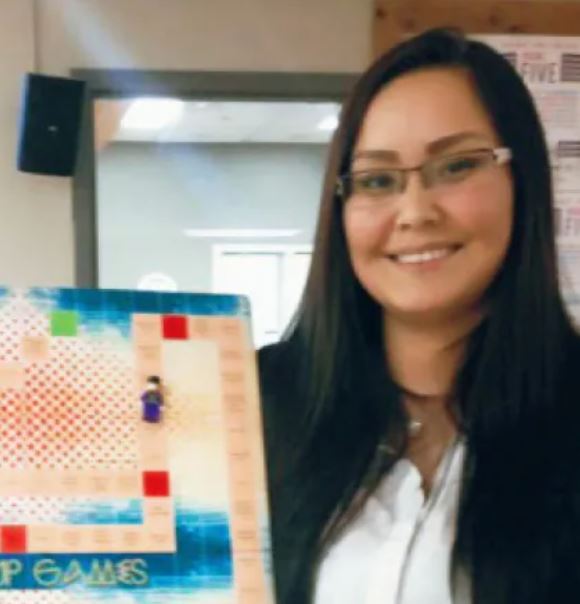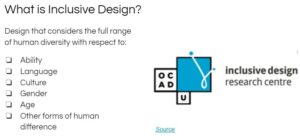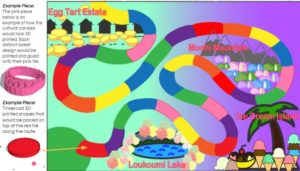I am not even sure I crafted a proper HMW question at the beginning of this school year for the work I wanted to do. If I did, I can’t find it now… The reality is, I just wanted to get through in good health and in good spirit and I wanted the same for my students. Learning follows every intention of course, and so I have learned so much; about the strength of my community, the resilience of my students, about boundaries, about judgment, about investing in relationships, and about being human. But I want this reflection to pick up where I left off on my previous blog; integrating principles of DEI into my curriculum. I have sought out areas in my Design & Geography curriculum that could act as a natural place for deepening what I have traditionally done around instructing from a place of multiple perspectives.
For my Grade 8 Design course, we had units that needed to be entirely up-ended due to the pandemic and the uncertainty around the availability/use of specific tools/printers etc. We landed on a project that could incorporate SEL into its process while also allowing for deep learning on inclusive design principles and the opportunity to create using either high-tech materials and tools if at school or low tech if at home. Our unit was the re-design of familiar board games to enhance diversity/equity/inclusion.
At the outset, we assigned homework that was to do a board games inventory of their games closet… dig those things out and play a few with whoever was in their home. The students researched a bit about the health benefits of playing board games regularly and assessed some of their games for inclusivity – as defined by OCADs Inclusive Design Research Center:
We then invited speakers Pallavi Sodhi and Dr. Jason Lajoie from the University of Waterloo Games Institute to speak to our classes (over zoom) which was an exceptional experience.
“Throughout her presentation Pallavi provided explanations of how exemplary games like Rise Up, Spirit Island, and Arabian Pots employ design mechanics, characters, and narratives to embrace difference and welcome participation.”
You can see the full presentation and additional UW write-up HERE. UW is running a ‘Racial Equity Board Games Showcase’ later this spring, and although many contributing factors make it impossible for us to attend, the invitation from UW to our students for the future has provided an excellent opportunity for future thoughts around how we can continue to evolve this unit into a deeply meaningful and impactful project.
We chose the BH Grade 3 class as our clients as a relatively easily accessible client at this time. To get around distancing measures, students communicated through Google Forms to distribute an initial survey and through FlipGrid to share prototypes and receive feedback. We grouped students by game (depending on what they had access to at home) and then each student was tasked with re-designing some aspect of the game – characters, cards (or other pieces), the board, the instructions, the packaging. In the end, each group was able to produce a solid ‘proof of concept’ due to time constraints and lack of access to machines.
Here is one of my favourites: a ‘Candyland’ board re-design to represent sweets of the cultures represented in our Grade 3 classroom.
At the end of the unit, there are many ideas (and questions) I have for how I would like to build on this unit going forward. I think it would be amazing if we could turn this into a much longer unit in order for students to have more research, interviewing and learning time with clients; and to do a professional job of fabrication of component parts. I would love to diversify the client list, perhaps with other current partners that we may be able to see in person – residents at the Rekai Long Term Care home, students at Sunny View School for children with physical and developmental disabilities, Rose Avenue School or Wandering Spirit School. Having the opportunity to work with clients where the students can recognize the importance of the adage “nothing about us without us” is really an important piece of inclusive design. This brings me to something I’m keen to tackle… As we worked through the insights gained about our Grade 3 students, what their cultural backgrounds were, if they felt represented by the games they played … many students realized that most games did represent the majority of our Grade 3 population. There is a good opportunity here to dive into this a little I think, a discussion of dominant culture perhaps, but I’d like more guidance around how to present/facilitate a conversation like this.
I also love the idea of some kind of event at the end of this … perhaps we could, in future have students participate in the UW Racial Equity Games Showcase, or perhaps we could partner with another MYP Grade 8 Design class on the unit and host our own Showcase … make it a full day collaboration that provides a fun authentic social experience too … who’s interested?
Feature Image: Janelle Pewapsconias, creator of Neeched Up Games, designed a board game to teach players about indigenous history, culture, and life. https://www.cbc.ca/news/canada/saskatchewan/saskatchewan-woman-creates-indigenous-board-game-1.3321789



@acampbellrogers Wow this is so impressive along with and on top of all of the interntional work / thinking / reflection you have been doing around DEI this year. Applying a PBL framework with a “design /game based spin” is really creative and by the sounds of things really fun too. A great example of integrating multiple skills/lenses into a project with some real world application.
Wow, this is truly next level and thanks for sharing all the great resources. When I have time, and I will soon, I will come back to this. Have you started to share your learning beyond the blog with other schools?
I would be really interested! I already shared the Branksome Article you wrote in the CISOntario Newsletter with our PD Working Group and it’s contributing to our own professional reading at Lakefield.
Thanks for your thoughtful insights, always.